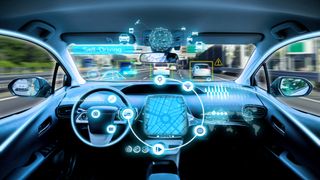Smart cars could be hijacked via AI hacking
"Model hacking" could put smart vehicles at risk, McAfee warns

Self-driving cars could be hijacked through outside forces able to change the Artificial Intelligence (AI) systems that power the vehicles, new research has claimed.
A report from McAfee says that a vehicle's AI system can be manipulated, possibly impacting the future and safety of autonomous vehicles.
This process, which McAfee calls "model hacking", is able to completely override the software systems within vehicles that are available to buy today, including models from Tesla.
- Self-driving cars: your complete guide to autonomous vehicles
- Google Play Protect blocked 1.9 billion malware installs last year
- Everything CES 2020 taught us about the exciting future of autonomous cars
Model hacking
McAfee’s Advanced Threat Research (ATR) and Advanced Analytics Teams were able to use "minuscule modifications" to create a black-box targeted attack on the Mobileye EyeQ3 camera system found in many modern vehicles, including certain Tesla models.
This attack allowed the researchers to cause a manipulate the AI technology within a Tesla model S implementing Hardware pack 1 to misclassify a speed limit sign that read 35, making it autonomously speed up to 85 mph.
Model hacking works by attacking the algorithms that go into defining rules for an AI system, such as the one found in autonomous vehicles. By negatively influencing or "poisoning" the training set used to create these AI models, hackers can affect nearly every aspect of how a software platform recognises and interacts with the world around it.
"Simply by perturbating – changing the magnitudes of a few features (such as pixels for images), zeros to ones/ones to zeros, or removing a few features – the attacker can wreak havoc in security operations with disastrous effects," McAfee researchers Steve Povolny and Celeste Fralick wrote in a blog post describing the attack.
Are you a pro? Subscribe to our newsletter
Sign up to the TechRadar Pro newsletter to get all the top news, opinion, features and guidance your business needs to succeed!
McAfee says that while there has been no documented report of model hacking in the wild yet, the interest in the field is growing, meaning hackers may have their own interests piqued soon. And with the number of vehicles with autonomous driving capabilities set to reach nearly 750,000 by 2023 according to Gartner research, the need to spot such new threats before they evolve is paramount.
"The good news is that much like classic software vulnerabilities, model hacking is possible to defend against, and the industry is taking advantage of this rare opportunity to address the threat before it becomes of real value to the adversary," the researchers noted.
- The best antivirus software for 2020

Mike Moore is Deputy Editor at TechRadar Pro. He has worked as a B2B and B2C tech journalist for nearly a decade, including at one of the UK's leading national newspapers and fellow Future title ITProPortal, and when he's not keeping track of all the latest enterprise and workplace trends, can most likely be found watching, following or taking part in some kind of sport.
